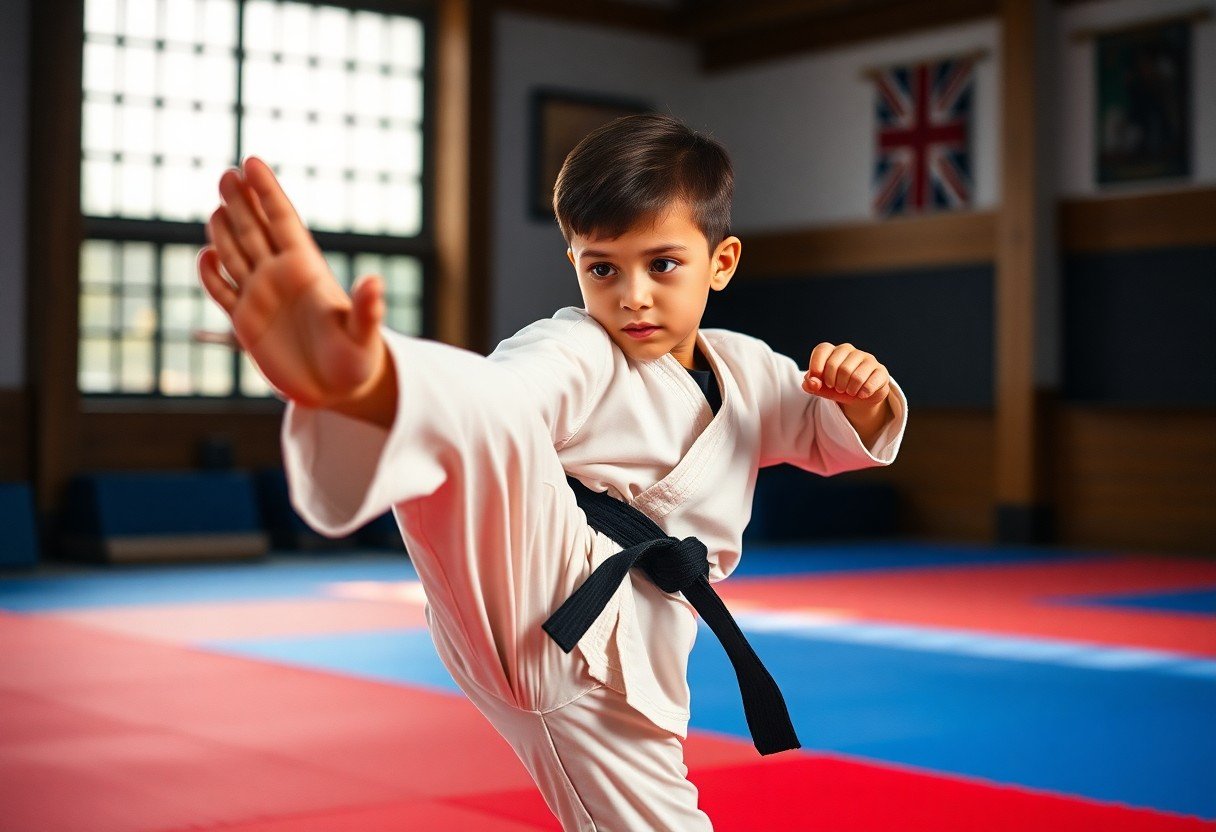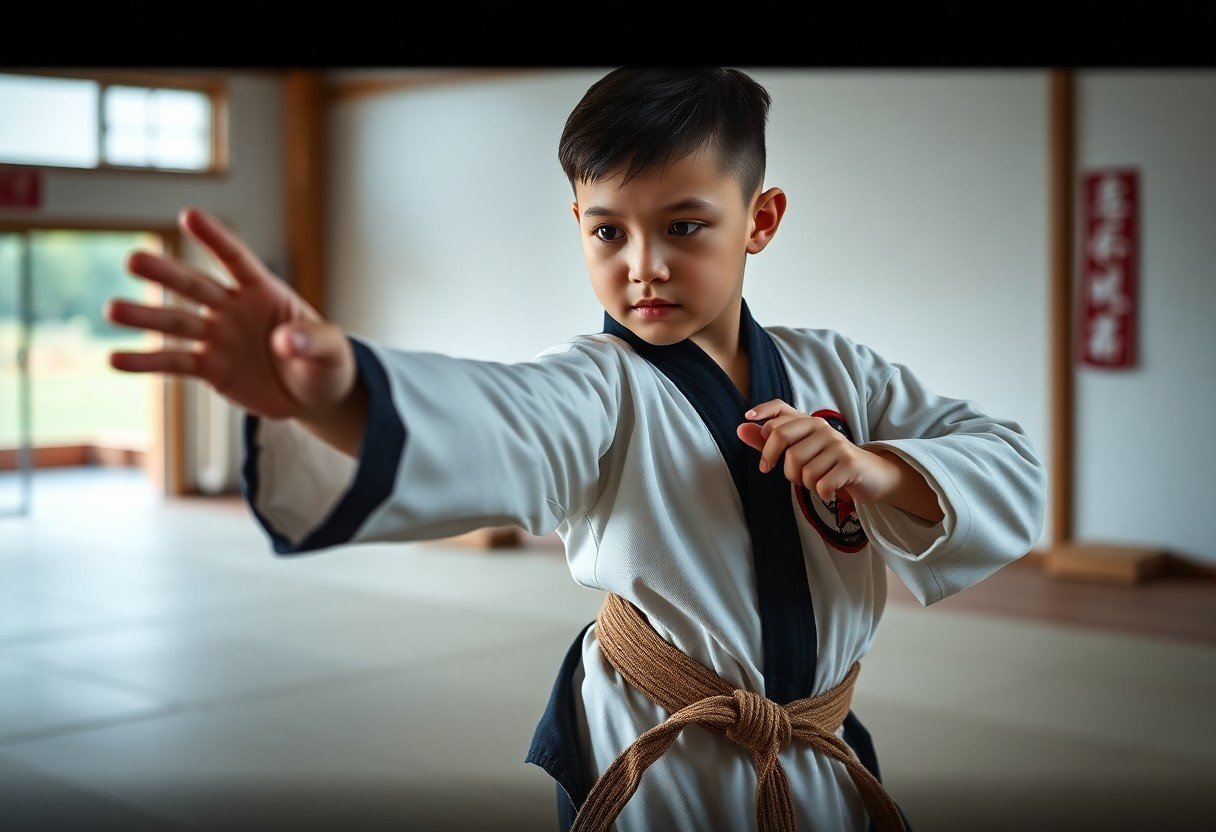You might be wondering if your child is ready to launch on a journey into the world of martial arts. There are several positive indicators that can reveal their readiness, such as a desire for discipline, confidence in social settings, and an eagerness to learn new skills. Moreover, if your child displays a keen interest in physical activity and demonstrates an energy that needs channeling, martial arts could be a fantastic outlet. It’s important to recognise these signs to ensure they embrace this enriching activity at the right time.
Signs of Physical Readiness
While evaluating your child’s readiness for martial arts, it’s imperative to assess their physical development. Martial arts training demands a level of physical fitness that can significantly enhance your child’s overall health and agility. If your child exhibits the necessary physical attributes, such as adequate strength and stamina, they may be well-suited to begin on this enriching journey.
Coordination and Balance
Balance is fundamental in martial arts, as it directly influences your child’s ability to execute techniques effectively. If your child shows good coordination in activities like running, jumping, or playing sports, they likely possess the physical readiness to begin training. Strong balance can also contribute to injury prevention, ensuring their safety during practice.
Strength and Endurance
Physical strength and endurance are vital indicators of your child’s readiness for martial arts. As they train, your child will develop muscle strength to perform various techniques and an increased ability to sustain energy throughout sessions. A solid foundation in strength and endurance not only enhances performance but also instills a sense of confidence and discipline. Building these attributes gradually through age-appropriate activities will prepare your child for the physical demands of martial arts, allowing for enjoyable and safe participation.
Understanding your child’s current level of strength and endurance can help you gauge their ability to handle martial arts training. Activities that build core muscles, enhance flexibility, and improve cardiovascular fitness are beneficial for preparing your child. When they display sufficient strength, they will be less likely to experience injuries and fatigue, leading to a more positive training experience and greater progress in their martial arts journey.
Emotional Readiness Indicators
Clearly, emotional readiness is necessary when considering martial arts for your child. Look for signs such as their ability to handle frustration, follow instructions, and express themselves appropriately. For insights on at what age should kids start learning martial arts?, understanding these indicators can help inform your decision.
Discipline and Focus
On the journey to mastering martial arts, discipline and focus are key attributes your child should possess. If they can pay attention for extended periods and follow rules consistently, they are more likely to thrive in a martial arts environment.
Confidence and Self-Esteem
Before engaging in martial arts, it’s important to assess your child’s confidence and self-esteem. A supportive training environment can enhance these traits, as martial arts encourages growth and perseverance.
Considering the importance of confidence and self-esteem, martial arts can significantly impact your child’s development. The structured setting promotes a sense of achievement, helping them build self-worth through skill mastery. As they advance, their ability to face challenges enhances, fostering a greater sense of security and resilience. Ultimately, participation in martial arts can lead to a strengthened belief in themselves, equipping them to navigate social situations with more assurance.
Social Skills and Team Dynamics
Any child who shows an interest in developing their social skills and learning how to work effectively in a team can benefit significantly from martial arts training. Engaging in a structured environment teaches them the importance of cooperation, respect, and teamwork, all of which are key components in martial arts. As they progress, they will learn how to communicate better with their peers and develop vital interpersonal skills that will serve them well in various aspects of life.
Ability to Follow Instructions
On commenceing on martial arts training, your child will be guided through various techniques and routines. The ability to follow instructions is important, as it enhances their focus and discipline. These skills not only help them in martial arts but also benefit their academic and social life, providing a solid foundation for any group activity.
Interaction with Peers
Above all, the interaction with peers in a martial arts setting can be an enriching experience for your child. The nature of training encourages positive relationships while instilling the values of patience and understanding. Your child will learn to navigate social dynamics effectively, resulting in enhanced self-esteem and a stronger sense of community.
Follow your child’s journey in martial arts and observe how their interactions with peers evolve. Through training, they will engage in cooperative activities and shared challenges, fostering bonds with fellow students. As they train together, they will learn to support one another, which can lead to lasting friendships. Additionally, the martial arts environment promotes respect for others, allowing your child to develop important social skills that will benefit them both in and out of the dojo.

Interest and Enthusiasm for Martial Arts
Many children display a natural affinity for martial arts, showcasing an eagerness to learn techniques that promote discipline and confidence. This enthusiasm can often manifest in their desire to watch martial arts films, attend classes, or even engage in pretend play that involves martial arts moves, signalling their readiness to participate in training.
Expressed Interest in Martial Arts
Martial arts training is often a fit for children who frequently express a desire to learn. If your child talks about martial arts, asks questions about different styles, or shows excitement about going to classes, these are strong indicators that they are ready to initiate on this journey.
Engagement in Related Activities
Along with verbal expressions of interest, you should also observe your child’s engagement in activities related to martial arts. This could include participation in various sports that require agility and coordination, or even involvement in games that require strategic thinking and teamwork.
And, being active in related activities not only enhances their physical capabilities but also fosters a mindset conducive to martial arts training. Your child’s athletic skills, coupled with a willingness to engage in teamwork and strategy, can greatly benefit their martial arts journey. Encouraging their participation in such activities will help them develop the necessary discipline and focus, making the transition to martial arts smoother and more effective.
Parental Considerations
After evaluating your child’s readiness for martial arts, it’s vital to consider what you, as a parent, hope to achieve through this training. Questions arise such as: What age is it appropriate to start martial arts? Additionally, contemplate how you will support your child’s journey in balancing training with other activities.
Assessing Goals and Expectations
Beside considering the characteristics of your child, you should also assess your own goals and what you expect from martial arts training. Reflect on whether you seek to improve their discipline, confidence, or social skills, guiding them accordingly as they commence on this martial arts journey.
Finding the Right School and Instructor
Above all, selecting the right school and instructor is vital to your child’s success in martial arts. You must ensure that the environment is safe, welcoming, and characterised by qualified instructors who foster a positive atmosphere while prioritising structured learning.
This process involves researching various schools and observing classes to gauge their approach. Look for an instructor who demonstrates experience and a passion for teaching children, as this can significantly enhance your child’s training. Be aware of the programme’s philosophy and culture, ensuring they align with your family’s values while also making sure that the school adheres to important safety measures.
Safety and Well-being
Not all martial arts training is created equal, and it is crucial to assess the safety measures in place before enrolling your child. Training environments should be well-maintained and supervised by qualified instructors who prioritise the safety and well-being of their students. Additionally, ensure that classes promote a culture of respect and discipline, as these factors contribute significantly to a positive learning experience for your child.
Understanding the Risks
For many parents, the thought of their child engaging in martial arts may raise concerns about potential injuries. While injuries can occur in any physical activity, it is vital to understand that martial arts also teach your child valuable skills related to control and discipline, which can help mitigate risks. Proper training focuses on safe techniques and injury prevention, making it a safer activity than it may initially seem.
Importance of Proper Gear and Environment
Above all, investing in appropriate safety gear plays a significant role in protecting your child during training. From mats to helmets, the right equipment can lessen the likelihood of injuries. Moreover, a suitable training environment that is clean, organised, and well-supervised encourages your child to focus on learning while keeping safety in mind.
Hence, the significance of proper gear and a safe training environment cannot be overstated. Your child should always wear appropriate protective gear, such as pads and mouthguards, which are designed to minimise the impact of strikes and falls. Furthermore, verify that the training area is equipped with quality mats to cushion any falls and prevent injuries. A well-structured environment ensures that your child can train safely, fostering confidence and promoting a long-term interest in martial arts.
To wrap up
So, determining whether your child is ready for martial arts involves observing their behaviour and readiness for physical activity. Signs such as an interest in martial arts, the ability to follow instructions, and a desire for discipline and focus indicate they might thrive in training. Additionally, ensure that they are physically able and show enthusiasm for learning new skills. By recognising these signs, you can make an informed decision about enrolling your child in martial arts, potentially setting them on a path to personal growth, confidence, and resilience.
FAQ
Q: What age is appropriate for a child to start martial arts training?
A: While it can vary based on the martial arts discipline and the child’s maturity, many schools offer classes for children as young as 4 or 5 years old. At this age, classes usually focus on basic motor skills and fun activities, helping to develop a foundation for more advanced training later on. It’s important to consider your child’s physical and emotional readiness when deciding.
Q: How can I tell if my child has the interest in martial arts?
A: Signs of interest may include a fascination with martial arts movies, imitating martial arts movements at home, or expressing a desire to participate in classes. Additionally, if your child shows enthusiasm while watching martial arts demonstrations or has friends participating, these can all be indicators of their readiness to start training.
Q: What qualities should my child possess to benefit from martial arts?
A: While every child is unique, some beneficial qualities to have include the ability to follow instructions, willingness to learn, and a basic understanding of respect for instructors and peers. Martial arts training can also enhance self-discipline and focus, so a child who is open to developing these characteristics may find martial arts especially rewarding.
Q: Are there any behavioural signs that indicate my child is ready for martial arts?
A: Yes, several behavioural signs can suggest readiness for martial arts. If your child demonstrates good listening skills, cooperative behaviour in group settings, or an interest in learning self-control, they may be well-suited for martial arts training. Additionally, if they often seek physical activities or opportunities to challenge themselves positively, it could reflect readiness for martial arts.
Q: What physical benefits can a child gain from martial arts training?
A: Engaging in martial arts can enhance a child’s physical fitness by improving strength, flexibility, coordination, and balance. Regular training provides an excellent cardiovascular workout and helps develop fine motor skills as well. These physical benefits contribute to overall well-being and can encourage a lifelong appreciation for an active lifestyle.



